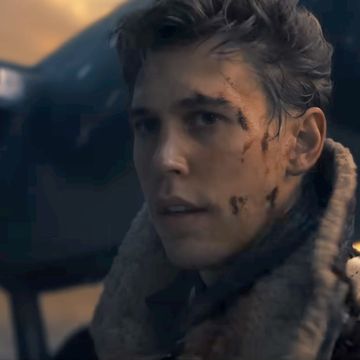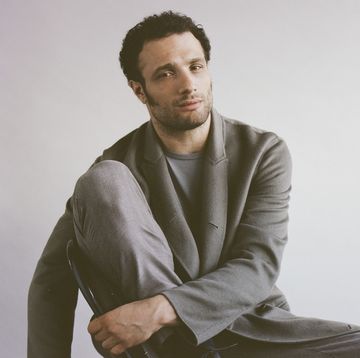Jonathan Groff knows you may not like his Mindhunter character too much by the end of your binge. FBI agent Holden Ford started out on David Fincher's simmering Netflix crime drama as a likeable enough hero—"a boy scout with a great idea," as Groff puts it. But as his pioneering research into the minds of serial killers begins to take off, his ego rapidly gets the best of him.
"Holden's kind of feeling himself in the last three episodes," Groff acknowledged when I spoke to him last month. "But I felt that his journey wasn't hard to empathise with, because I could totally track what was happening to him. His frustration with the OPR, his frustration with his co-workers, his frustration with his girlfriend—it all made complete sense to me."
The season finale found Holden licking his wounds after multiple tough, if well-deserved, rejections—from his girlfriend Debbie (Hannah Gross), his partner Bill (Holt McCallany), and potentially the entire bureau. And so, in the episode's intensely unsettling final scenes, he takes a trip to California to visit Ed Kemper (Cameron Britton), the first serial killer he ever interviewed, for a reunion that ends up bringing him back down to earth in psychologically brutal fashion.
Below, Groff breaks down that chilling final beat, Holden's controversial decision with that high school principal, and why he was initially nervous about how the show would be received.
That finale scene between Holden and Ed Kemper was deliberately played like the climactic beat in a warped love story.
I love the evolution of the Ed Kemper-Holden Ford relationship, the arc of it through the season, and the way the writers put in this energy at the end almost like Ed is this jilted ex-lover. Holden is so completely different in his final scene with Ed than in his first scene with Ed. In that first scene we see him buttoned up, horrified, scared, and then in their final scene you have him sort of begrudgingly come back to visit Ed when he's got nobody else in his life. It's that sort of desperation and need that drives him straight to the centre of it all with Ed. And Ed is the one who gives him the wakeup call.
I remember when we were in rehearsals, [series creator] Joe Penhall saying, "What if Ed hugs him? What if the end of the first season is the serial killer hugging the profiler? Isn't that a horrifying image?" Cameron is so amazing, and when I read the scene with him for the first time, the hair stood up on the back of my neck. That final scene was easy to act, because he is truly terrifying.
Though Mindhunter's characters are only loosely inspired by real-life FBI profilers, Groff and McCallany are in regular contact with John Douglas, who wrote the book upon which the show is based.
Holden is a completely different beast than John Douglas, but Holt and John and I are on an email chain together. I started by reading his book, and he's so forthcoming and honest about his personal experiences there. He talks a lot about the emotional and physical toll that speaking to the serial killers, but even more so the victims, had on him, which obviously is a huge part of all of our characters' journeys.
If you were troubled by that storyline about the principal who refused to stop tickling children—and felt Holden was probably right to get him fired—you're not alone.
Right? Come on! He's so weird! One of the things David said that really stuck with me in rehearsals was: I'm only interested in arguments where both sides are correct. I think that scene is a perfect example, because [the writers] were very meticulous about which characters were going to empathise with which side, and I think hopefully some viewers will err on one side and others will err on the other. But I'm with you, obviously, because I played Holden and also I think the easy answer is: just stop doing it! I love the complexity of the phone call, because Holden doesn't outright say yes, fire him. He gives his honest opinion without asking them to do anything. He does take these bold steps, but they're also completely justified.
Geoff was unsure how the show would be received, and whether its rhythm would jibe with viewers.
I didn't know if audiences were going to have the patience to watch people talking. I fully believe in the show and I believed in David's mission statement—that there wouldn't be big action sequences, that it would be this cerebral look into the minds of serial killers and into the minds of people that are investigating them. In a world where TV has to be so sensational because there's so much of it, Mindhunter really is just people in rooms talking. So the reactions I've had where people say "I'm so addicted, I can't stop watching," I find it so inspiring that conversation can have such intrigue and interest, and that people want to lean in and put their phones down, because you can't text and watch Mindhunter. You have to give it your full attention, I think. The fact that people are willing to put their phones down and turn the lights out in their apartment and sit with these characters and do this deep psychological dive, that's thrilling.
Often my favourite scenes to do are these incredibly clinical, dry informational scenes where we're with Wendy and Holden and Bill, and they're kind of contextualising the information that we got from the serial killers. You're watching the whole Behavioural Science Unit come together. We'd be doing the scenes and I'd get butterflies in my stomach—even the idea that at the end of Episode Four, getting funding could be so dramatic! Or that the climax of the penultimate episode could be us having a fight about OPR in the basement. The way David has made this intellectual psychological material feel so important and immediate and dynamic is a revelation to me.














